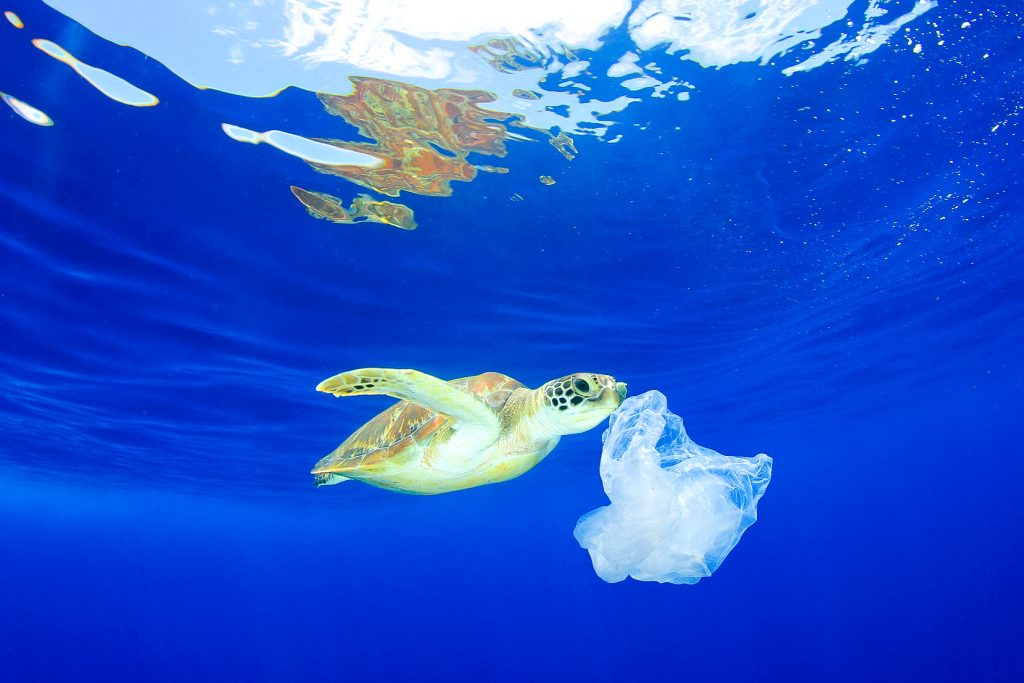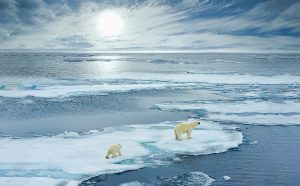Preserving Earth: A Moral and Religious Obligation

It is no secret that Earth’s biodiversity is rapidly declining because of human activity. Due to the continuous production of greenhouse gases over the past century, global temperatures have been rising consistently. Glaciers are melting rapidly, causing sea levels to rise, and endangering coastal communities all over the world. Droughts and heatwaves are becoming more intense and lasting longer than usual. The oceans are so rife with plastic debris that at least 267 species1 are succumbing to it. Our planet is in peril, and we must take immediate actions to prevent further detriment to our world. God says in the Holy Quran, “Cooperate with each other in righteousness and piety, not in sin and hostility. Have fear of God; He is stern in His retribution.”2 As Muslims, it is imperative for us to join the global community to take a unified approach when it comes to solving the issue of climate change to ensure the vitality of not only the life on this planet but the planet itself.
Human Activity is Causing Climate Change
Over the course of the past decade or so, climate scientists around the globe have repeatedly provided conclusive evidence that human-produced greenhouse gases, such as carbon dioxide and methane, are causing a significant rise in global temperature. According to the experts, since the advent of the industrial revolution, the global temperature has risen almost two degrees Fahrenheit, due to which natural landscapes are languishing at an alarming rate, causing countless species to lose their habitat, which could eventually result in mass extinctions. An extensive report3 by the United Nations has concluded that, because of human actions, at least one million plant and animal species are facing inevitable extinction if swift actions to safeguard Earth’s biodiversity are not taken. Without immediate actions, “There will be a further acceleration in the global rate of species extinction, which is already at least tens to hundreds of times higher than it has averaged over the past 10 million years.”4
Planet or Plastic?
Plastic pollution is another major factor that is contributing to the decline in species on land and in the ocean. Plastic is an indigestible material, its use is ubiquitous, and it is adversely affecting not only wildlife but also human beings. A report by the Earth Island Journal states that, “Once in the environment, plastic breaks down into smaller and smaller particles that attract toxic chemicals, are ingested by wildlife on land and in the ocean, and contaminate our food chain.”5 According to National Geographic, “Nearly 700 species, including endangered ones, are known to have been affected by it. Some are harmed visibly—strangled by abandoned fishing nets or discarded six-pack rings. Many more are probably harmed invisibly. Marine species of all sizes, from zooplankton to whales, now eat microplastics, the bits smaller than one-fifth of an inch across.”6 Most of the plastic that is produced ends up in the environment, including the oceans, affecting life on both land and water. Rapid loss of marine life will devastate communities around the world that rely heavily on fisheries for subsistence.
Human Beings are the Inheritors of This Planet

God says in the Holy Quran, “It is He who has made you successors on the earth.”7 God has entrusted us with the task of protecting our planet from environmental degradation. It is our religious and moral obligation to ascertain the longevity of Earth’s various ecosystems. As the inheritors of this planet, the onus is on us to ensure that all forms of life continue to flourish in their natural habitats. Encroaching upon the habitats of myriad species and causing irreparable damage to those habitats for our own selfish gains is highly imprudent. God also says in the Holy Quran, “Do not be a wasteful spender. Squanderers are the brothers of Satan. Satan was faithless to his Lord.”8 God withholds His Mercy from those who misuse and mistreat His creations with reckless abandon. He says they are akin to Satan, who went against God’s command and was therefore rebuked by the Almighty for his perverse disposition. As Muslims, we must protect all of God’s creations, because in the hereafter, God will hold us accountable for all our actions.
Protect the Environment
1. Reduce the Use of Plastic – Plastic pollution is one of the major contributors toward the decline of marine life. According to the World Wildlife Fund, “Eight million tons of plastic end up in our oceans every year, killing and harming marine life.”9 Some of the easiest ways to reduce plastic waste are by ditching straws, cutlery, water bottles, gum, and coffee cups that are made out of plastic.
2. Reduce Carbon Footprints – A carbon footprint, quite simply, is the amount of greenhouse gases, such as carbon dioxide, methane, and nitrous oxide, released into the Earth’s atmosphere by a person, product, or an event. Some of the ways in which we can reduce our own carbon footprints are by car-pooling or using mass transit, buying energy-efficient appliances, purchasing organic and locally-produced food, and routinely reusing and recycling items that we use daily.
3. Cut Down on Meat Consumption – Controlling or reducing meat consumption, and not necessarily eliminating it from one’s diet, is one of the most effective ways of curtailing global emissions. According to a report by the Food and Agriculture Organization, “With emissions estimated at 7.1 gigatonnes CO2 -eq per annum, representing 14.5 percent of human-induced greenhouse gas emissions (GHG), the livestock sector plays an important role in climate change. Beef and cattle milk production account for most emissions, respectively contributing 41 and 20 percent of the sector’s emissions.”10
1. “The Problem of Marine Plastic Pollution.” Clean Water Action. December 20, 2017. https://www.cleanwater.org/problem-marine-plastic-pollution.
2. The Holy Quran 5:2, Muhammad Sarwar translation.
3. “Summary for policymakers of the global assessment report on biodiversity and ecosystem services of the Intergovernmental Science-Policy Platform on Biodiversity and Ecosystem Services.” IPBES. May 6, 2019. https://www.ipbes.net/sites/default/files/downloads/spm_unedited_advance_for_posting_htn.pdf.
4. “Summary for policymakers of the global assessment report on biodiversity and ecosystem services of the Intergovernmental Science-Policy Platform on Biodiversity and Ecosystem Services.” IPBES. May 6, 2019. https://www.ipbes.net/sites/default/files/downloads/spm_unedited_advance_for_posting_htn.pdf.
5. “Plastic Pollution Coalition.” Earth Island Journal. https://www.earthisland.org/journal/index.php/magazine/entry/plastic_pollution_coalition/.
6. Treat, Jason, Ryan Williams, Jason Treat, Ryan Williams, Jason Treat, and Ryan Williams. “We Depend On Plastic. Now, We’re Drowning in It.” We Depend on Plastic. Now We’re Drowning in It. May 16, 2018. https://www.nationalgeographic.com/magazine/2018/06/plastic-planet-waste-pollution-trash-crisis/.
7. The Quran 6:165, Ali Quli Qarai translation.
8. The Holy Quran 17:27, Muhammad Sarwar translation.
9. Mramstead. “Ten Tips to Reduce Your Plastic Footprint.” WWF. March 02, 2018. https://www.wwf.org.uk/updates/ten-tips-reduce-your-plastic-footprint.
10. “Tackling Climate Change Through Livestock. A Global Assessment of Emissions and Mitigation Opportunities.” Food and Agriculture Organization of the United Nations. https://www.fao.org/3/i3437e/i3437e.pdf.
2. قال تعالى: ﴿وَتَعَاوَنُوا عَلَى الْبِرِّ وَالتَّقْوَىٰ ۖ وَلَا تَعَاوَنُوا عَلَى الْإِثْمِ وَالْعُدْوَانِ ۚ وَاتَّقُوا اللَّـهَ ۖ إِنَّ اللَّـهَ شَدِيدُ الْعِقَابِ﴾ [القرآن الكريم: المائدة ٥، آية ٢]
7. قال تعالى: ﴿وَهُوَ الَّذِي جَعَلَكُمْ خَلَائِفَ الْأَرْضِ﴾ [القرآن الكريم: الأنعام ٦، آية ١٦٥]
8. قال تعالى: ﴿إِنَّ الْمُبَذِّرِينَ كَانُوا إِخْوَانَ الشَّيَاطِينِ ۖ وَكَانَ الشَّيْطَانُ لِرَبِّهِ كَفُورًا﴾ [القرآن الكريم: الإسراء ١٧، ٢٧]

Leave a Comment:
You must be logged in to post a comment.